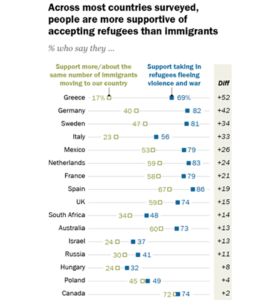Refugees more welcome than migrants in most countries – survey shows
Most people around the world are more accepting of refugees fleeing violence and war than they are of migrants arriving in their countries, according to new research by the Washington-based think tank the Pew Research Center.
 An analysis of public opinion data from 18 nations surveyed by the Pew Center last year found more sympathy with refugees forced to flee than those seeking new lives in new countries.
An analysis of public opinion data from 18 nations surveyed by the Pew Center last year found more sympathy with refugees forced to flee than those seeking new lives in new countries.
The research comes as many countries are grapple with a surge in refuges and migration amid the ongoing civil war in Syria and other armed conflicts in the Middle East.
According to the United Nations, there are 258 million people living outside their country of birth including around 70 million forcibly displaced.
Across the 18 countries surveyed, a median of 71 per cent of adults said they support taking in refugees fleeing violence and war. By contrast, a median of 50 per cent said they support “more” or “about the same” number of immigrants moving to their country, a 21 percentage point difference.
The gap was largest in Greece, where 69 per cent supported taking in refugees, compared with just 17 per cent who supported more or about the same number of immigrants moving to their country. In Germany, people were also much more likely to support taking in refugees (82 per cent) than immigrants (40 per cent).
In Australia 60 per cent of people supported more, or about the same number of immigrants arriving, while 73 per cent said they supported taking in refugees.
“In the United States, public support for accepting refugees and immigrants was roughly equal in the 2018 survey (66 per cent and 68 per cent, respectively). In 2018, the US resettled 23,000 refugees, down from 33,000 the previous year and a recent high of 97,000 in 2016. At the same time, new immigrant arrivals to the U.S. have also fallen,” the report’s authors Raea Rasmussen Jacob Poushter said.
“In a separate Pew survey conducted in the northern spring of 2018, 51 per cent of Americans said the US ‘has a responsibility to accept refugees into the country’, while 43 per cent said it does not,” report said.
In Japan, surprisingly, 81 per cent supported more or about the same number of immigrants moving to their country, while a smaller share (66 per cent) supported taking in refugees, the report said.
Despite reaching its highest-ever foreign national population of 2.7 million in 2018, Japan’s population continues to shrink. Only China is expected to lose more people by the year 2100, according to recent UN population projections.
The report found that globally, attitudes towards accepting refugees and immigrants often differed depending on whether respondents see diversity as beneficial for their country. Overall, people in 14 of 18 countries surveyed were more likely to favour diversity than oppose it.
Australians are among the greatest supporters of diversity, with 74 per cent saying they favoured diversity.
“Across most of these countries, people who favour diversity tend to support both immigrants and refugees moving to their country. For example, in Canada, 87 per cent of those who favour diversity were also in favour of immigrants moving to their country, compared with only 26% of those who oppose diversity,” the report said.
“Similarly, 87 per cent of Canadians who favour diversity expressed support for taking in refugees, compared with just 40 per cent of those who oppose diversity.
“This pattern held true in 15 of the 17 countries surveyed. However, in South Africa and Mexico, there were almost no differences between those who oppose and favour diversity,” it said.
The survey found that in general, people who oppose diversity are also more likely to see immigrants as a burden on society.
“For example, in Sweden, 67 per cent of those who oppose diversity said immigrants today are a burden on their country ‘because they take our jobs and social benefits’, compared with 13 per cent of Swedes who favour diversity,” the report said.
“These gaps were also wide in Canada (52-point difference between those who oppose and favour diversity), Australia (50-point difference) and the US (33 points),” it said.
“In most of the countries surveyed, those who oppose diversity were also more likely to say immigrants want to be distinct from their country’s society. In addition, they were less likely to support encouraging highly skilled people to immigrate and work in their nation,” the report said.












